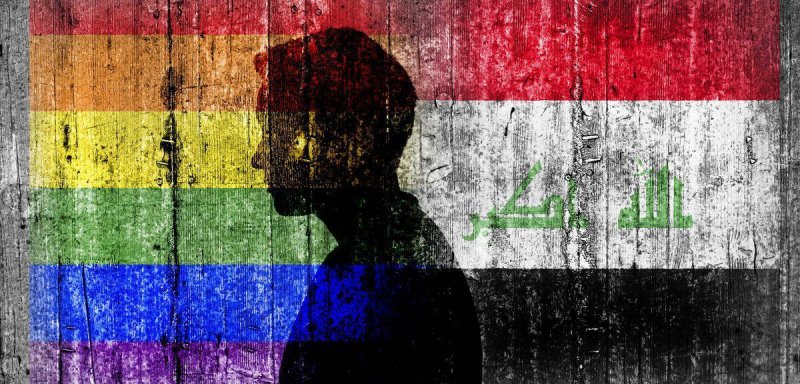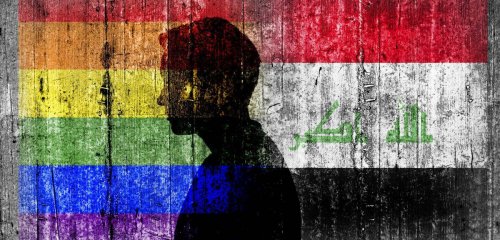Muhannad, 43, has been hiding his sexual orientation for more than 25 years. He lives in an Iraqi city that he even refuses to name, and tries to stay away from anything and everything that may point to him and his orientation. He avoids everything that could make him more visible in a society that will not accept him, and may even kill him, just like what has happened with many members of the LGBT community in Iraq.
Today, he is looking, just like he has been doing for the past years, for any opportunity that’ll take him to a country that would allow him to live his life. He wants to change his name to a female one, and he also wants to wear women’s clothes and sit and put on beauty products in front of the mirror. He wants a life that he can live and feel like he belongs to. He wants to feel like he is doing what makes him, him, and not this person who hides from both his small family and from society as a whole.
Muhannad tells Raseef22, “When I leave this country, I will be far from my family and will not tell them that I have turned into a woman, even though that is how I will live, because I am afraid that they will be threatened and that I will burden them with more than they can handle in our society.” He adds, “When I hear about the killing of a young man in Iraq because of his sexual orientation, it makes me very sad and afraid at the same time because I am aware that I am in constant danger and that I have no choice but to escape or wait for death, and all I want is to be myself. Every person should decide what he wants in his life freely and safely.”
The methods of violence that members of the LGBT community are subjected to vary in Iraq, a country that has recorded acts of violence against many young people because they belong to this community. In some cases, this violence was practiced even on those who did not declare their sexual orientation, and the mere suspicion of a person belonging to the LGBT community would turn him/her into a target. At the same time, ISIS has maintained various methods of killing, and we know some of its most brutal methods because the organization has publicly and openly demonstrated them on those suspected of being from the LGBT community, pushing some from the rooftops of buildings to their death.
Human Rights Watch documents
A few days ago, Human Rights Watch (HRW) issued an extensive report in which it documented the testimonies of dozens of members of the LGBT community in Iraq, and the violations that are taking place against them. The organization accused “armed groups in Iraq of kidnapping, raping, torturing, and killing transvestites, gays, lesbians, and bisexuals”, without being punished for their crimes.
The organization accused the Iraqi government of failing to hold the perpetrators accountable, and said that the “Iraqi police and security forces are often complicit in compounding” acts of violence against LGBT people, “arbitrarily targeting and arresting individuals due to non-conforming appearance”. In its report, the organization presented a picture of how members of the LGBT community are “besieged from multiple directions”, including extreme violence at the hands of family members, harassment in the streets, digital targeting, as well as harassment by armed groups on social media and same-sex dating apps.
Rasha Younes, LGBT rights researcher in the Middle East and North Africa Division of Human Rights Watch, says that “LGBT rights advocates and organizations in much of the Middle East and North Africa are facing violence and discrimination, and there are laws that criminalize same-sex relations in most countries of the region.”
When I hear about the killing of a young man in Iraq because of his sexuality, it makes me sad and afraid at the same time because I am aware that I am in constant danger and that I have no choice but to escape or await death
“Some countries that do not practice this use other laws to target people of the LGBT community,” she adds. “LGBT Iraqis live in constant fear of being hunted down and killed by armed groups with impunity, as well as arrest and violence by Iraqi police, making their lives unlivable. The Iraqi government has done nothing to stop the violence or hold the abusers accountable.”
The 86-page report documents “cases of attempted murder of LGBT people by armed groups primarily within the Popular Mobilization Forces (PMF), which are nominally under the prime minister’s authority.” Human Rights Watch also documented “cases of abductions, extrajudicial killings, sexual violence, and online targeting of LGBT people by the police and armed groups.”
The rights organization concluded that “the Iraqi government is responsible for protecting LGBT people’s rights to life and security but has failed to hold those responsible for the violence accountable.”
Major General Khaled al-Muhanna, a spokesman for the Iraqi Interior Ministry, denied any attacks by security forces on the LGBT community. A PMF commander who was contacted by The Associated Press rejected these accusations, saying that any possible violence was likely from their families.
The human rights group report notes that, “LGBT people’s ability and willingness to report abuses they face to the police or file complaints against law enforcement agents are impeded by a combination of loosely defined ‘morality’ clauses in Iraq’s Penal Code, and the absence of reliable complaint systems and legislation protecting them from discrimination. This has created an environment in which armed government actors, including the police, can abuse LGBT people with impunity.”
Constant fear
Two members of the LGBT community, one who identifies as bisexual and the other as lesbian, interviewed by The Associated Press in Baghdad say they are afraid to post their photos on same-sex dating apps for fear that it would be used against them. They spoke on condition of anonymity for fear of reprisals from armed groups and their families, and said the fear of extortion and blackmail is widespread among the LGBT community in Iraq.
The bisexual Iraqi man, a filmmaker living in Baghdad says, “When I choose to open myself up to someone (about my sexual orientation) I wonder, can I trust them? Or will they use this against me?” He then adds, “I’ve lived in fear every day of my life since I discovered myself (to be bisexual).”
The lesbian woman is an employee at a foreign embassy. She says she confided in only a few close friends, and when asked what was the worst that could happen if she told her family about her orientation, she said, “They would kill me.”
In late January, the Dohuk governorate in Iraq witnessed a heinous crime, after a young man killed his 23-year-old transgender brother. Brendar Dosky, director of Mankish district where the victim was found, told the Rudaw media network that the victim’s family informed the police that it had killed its (transgender) son, and provided them with the location of the body in the village of Babukhki.” It has been widely circulated that the transgender’s brother had come from Europe and carried out his crime with both the knowledge and consent of the family.
The United Nations Mission in Iraq (UNAMI) called on the Kurdistan Regional Government (KRG) to thoroughly investigate the suspect and prosecute the perpetrator, noting that hatred, discrimination, and so-called honor crimes have no place in democratic societies, and that investigation and accountability are essential to prevent such horrific crimes, under any pretext.
The Law
Iraq has not legislated a law protecting the rights of homosexuals or transgender people. Rather, the Iraqi Penal Code holds them accountable and imposes a penalty equivalent to that given to rapists. Anas al-Azzawi, member of the Office of the Iraqi High Commissioner for Human Rights (IHCHR), tells Raseef22 that “Iraqi laws, including the revised Penal Code of 1969, have all set penalties for cases regarding the LGBT community equal to those of rape, and they range from seven years in prison to life imprisonment in cases of aggravating circumstances.”
It is worth noting that the state of Iraq has not ratified any agreement or treaty pertaining to gay rights, on the pretext that it opposes Islamic Sharia and the provisions of the Iraqi constitution.
He adds, “The societal rejection of gays, lesbians, and transgender people has been translated into various forms of violence (murder, torture, defamation, and mutilation), and in some cases this violence relied on religious fatwas or political agendas, and this is what has prompted many of them to move to the Kurdistan region, seek the help of a number of diplomatic missions that support LGBT rights, or seek immigration through international organizations.”
The majority of Iraqis refuse to even talk about the LGBT community that is suffering from systematic persecution, a community where the majority of its members are constantly looking for an opportunity to escape to a country that recognizes their rights, instead of staying prisoners to the fear of revealing the truth about themselves.
Raseef22 is a not for profit entity. Our focus is on quality journalism. Every contribution to the NasRaseef membership goes directly towards journalism production. We stand independent, not accepting corporate sponsorships, sponsored content or political funding.
Support our mission to keep Raseef22 available to all readers by clicking here!
Interested in writing with us? Check our pitch process here!







Join the Conversation
ذوالفقار عباس -
1 hour agoا
Hossam Sami -
1 hour agoصعود "أحزاب اليمين" نتيجة طبيعية جداً لرفض البعض; وعددهم ليس بالقليل أبداً. لفكرة الإندماج بل...
Anonymous user -
1 day agoرائع و عظيم ..
جيسيكا ملو فالنتاين -
5 days agoزاوية الموضوع لطيفة وتستحق التفكير إلا أنك حجبت عن المرأة أدوارا مهمة تلعبها في العائلة والمجتمع...
Bosaina Sharba -
1 week agoحلو الAudio
شكرا لالكن
رومان حداد -
1 week agoالتحليل عميق، رغم بساطته، شفاف كروح وممتلء كعقل، سأشاهد الفيلم ولكن ما أخشاه أن يكون التحليل أعمق...